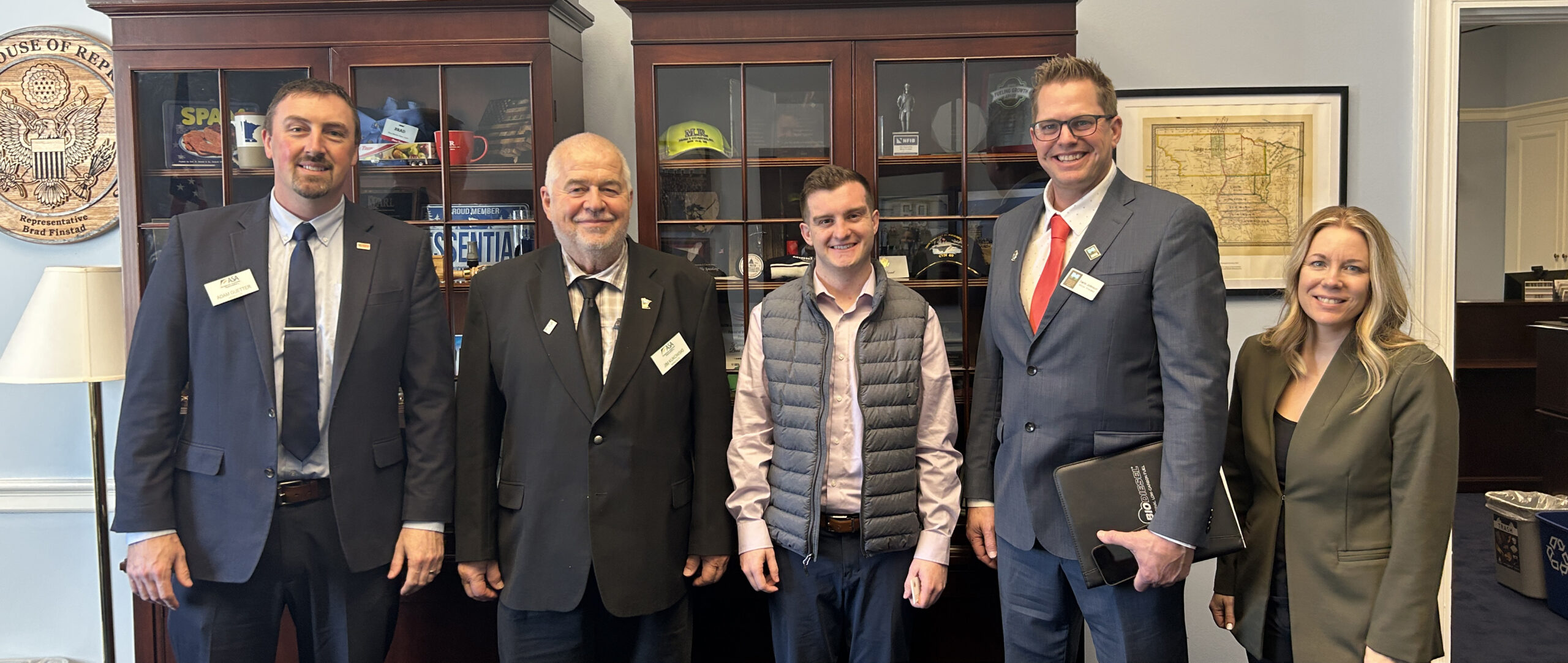MN farmers find footing on the Hill
MN farmers find footing on the Hill

Darin Johnson doesn’t do doom and gloom. The Wells farmer prefers keeping a challenging policy outlook in its proper perspective, rather than getting bogged down in a cycle of negativity.
“It’s always a great day when you’re talking about farming and advocating for soybean growers,” Johnson, the president of the Minnesota Soybean Growers Association, said March 19 after a full day on Capitol Hill visiting with nine of Minnesota’s congressional offices. “It’s a privilege to be at the Capitol and represent our industry and talk about the issues.”
Sure, there are myriad, complex challenges facing farmers on several fronts: A nearly 50% drop in commodity prices since 2022 while inputs remain high. Potential trade wars with U.S. agriculture’s three largest trading partners. Uncertainty in the biofuels market. Attacks on crop protection tools and seed oils. But growers attending the American Soybean Association’s March 2025 board meetings in Washington, D.C., were buoyed by the USDA’s announcement on National Ag Day that $10 billion in economic assistance was ready for distribution on the eve of planting season.
“There are a lot of ways in which all these issues could be turned into positives,” said Wheaton farmer Jamie Beyer, one of six Minnesota farmers on ASA. “But they can also turn into negatives if not handled quickly.”

Members of Congress were back in their home districts during Hill Visits. Thus, two sets of directors visited with legislative aides across both parties in the House and Senate. Grower leaders visited with staffers both familiar and new, including an introductory visit to Rep. Kelly Morrison’s staff.
“We got a chance to meet with Rep. Morrison’s staff and highlight that agriculture has an impact on literally every district in our state,” Johnson said.
Johnson and Beyer were joined by Directors George Goblish, Adam Guetter, Jim Kukowski, Jeffrey Sorenson, Bob Worth and Executive Director Joe Smentek. Throughout the meetings, advocates promoted a range of urgent farm-related policies, each of which holds importance to growers across Minnesota and the nation.
The breadth of issues is a lot to consume.
“There are more issues happening in agriculture right now than I can ever remember,” said Bob Worth, who is planting his 55th crop this spring in Lake Benton.
Trade
About 60% of Minnesota’s soybean crop is exported. In the 2023/24 marketing year, U.S. exporters shipped nearly $24 billion worth of soybeans (46.1 million metric tons) to international markets. China remains far and away the largest importer of U.S. Soy, and growers are concerned an escalated and prolonged trade war could have devastating, long-lasting effects.
“We still haven’t fully recovered from the last (2018-19) trade war,” ASA Director Adam Guetter said. “While opening new markets is crucial, it’s important we maintain our established relationships.”
Kukowksi, who farms about 30 miles from the Canadian border, said growers depend upon Canada to purchase potash. Canada is also the top market for U.S. soybean oil.
“A trade war with our neighbors could really hurt us,” he said.
If resolved swiftly, new trade agreements could prove beneficial to the nearly half-million soybean farmers in the U.S. A prolonged dispute, however, would likely bring long-term damages. During the last trade war, U.S. ag absorbed $27 billion in damages; soybeans accounted for 71% of those annualized losses.
“These are relationships we’ve spent decades building,” Johnson said. “We understand the need to negotiate, but we want to remain reliable trading partners and have seen already.”
Farm Bill
Passing a new Farm Bill after two years of extensions in critical, Johnson told staffers of Sen. Amy Klobuchar, ranking member of the Senate Ag Committee. ASA, echoing its priorities over the past several years, continues seeking a comprehensive Farm Bill that improves the farm safety net; increases funding for trade programs to diversify markets; enhances crop insurance; and protects the farmer-funded soy checkoff.

“It’s imperative that we get this resolved in a timely fashion and keep the wheels moving,” Johnson said.
Kukowski emphasized the benefits of the soy checkoff, which generates $12.30 for every dollar invested.
“I wouldn’t be here without the checkoff,” he said. “It’s done so much for farmers – created new uses, built markets, developed new varieties.”
Make America Healthy Again
In early March, over 300 ag groups, including MSGA and ASA, sent a letter to the Make America Health Again (MAHA) Commission to urge the commission to use sound science, dispel myths and protect the use of crop inputs.
Growers asked congressional staffers to share the letter and explained how crop protection tools are applied safely.
“There’s a lot of rhetoric and misguided health claims out there that are certainly not true,” Kukowski said. “The crop we produce is safe and backed and proven by science.”
Biofuels
Nearly half of the U.S. domestic soybean oil is used to produce biodiesel. Directors endorsed setting robust renewable volume obligations (RVO) under the Renewable Fuel Standard for 2026 and beyond; and encouraged the extension of the Clean Fuel Production Credit (45Z), which offers significant growth opportunities for soy-based biofuels. ASA endorses the continued inclusion of value-added farm practices to increase tax credits under 45Z.
Shipbuilding
In the days leading up to the Hill Visits, a new policy roadblock emerged when the U.S. Trade Representative proposed remedies to increasing reliance on foreign shipbuilders in international trade by requiring U.S. exporters to use a merchant maritime fleet that consists of at least 5% U.S.-built vessels and 15% U.S.-flagged vessels after seven years.
Placing taxes or fees on most of the maritime fleet will increase costs for U.S. farmers and bring crops to market.
“We fully support manufacturing in the U.S., but this would take years to come to fruition,” Guetter said, “and in the near term, farms will pay the cost.”
Farm Service Agency
In a cost-cutting move, the USDA has closed select Farm Service Agency offices across the country. Kukowski, who has been nominated to serve on Minnesota’s FSA Committee, said he appreciated that FSA efficiencies could be improved, but underscored how growers rely on their local FSA for several services.
“That’s our livelihood, those FSA offices,” he said. “When times are tough like they are now, we need FSA to roll out those programs.”
Growers capped the day with a visit to downtown D.C. with the Environmental Defense Fund, highlighting how Minnesota farmers grow a sustainable, high-quality crop.
“We’re all trying to do the best practices,” Johnson said. “We want to turn our farms over to the next generation.”
Minnesota farmers will return to the nation’s capital in July during ASA’s summer board meetings. In the meantime, with spring arriving, Johnson remains optimistic.
“From water quality issues to biofuels, we’re doing everything we can to steer the ship in the right direction,” Johnson said. “The ag economy ebbs and flows, and we’re working to bridge the gap.”


